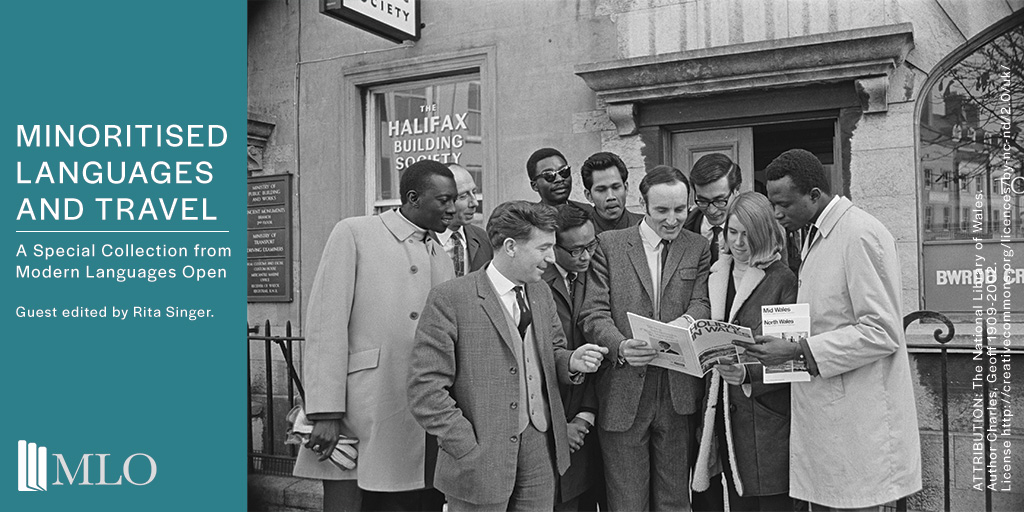This Special Collection from Modern Languages Open focuses on the interplay between, and intersection of, minoritised cultures and language within tourism, travel, and travel writing. In five articles, the contributors lay bare the frictions between travellers and travellees, as well as the inherent instability of social, cultural, and language hierarchies. To all intents, the travel writing under observation evidences how (c)overt hierarchies, even between variously minoritised actors, can transform cores into peripheries and vice versa.
The introduction and three of the five articles explore intra- and intercultural experiences with Wales and Welshness. In her article, ‘The Picturesque and the Beastly: Wales and the Absence of Welsh in the journals of Lady’s Companions Eliza and Millicent Bant (1806, 1808)’, Kathryn Walchester explores the silencing of Welsh travellees through an examination of the personal diaries of two lady’s companions, sisters Eliza and Millicent Bant.
Walchester traces how paternalistic attitudes towards Wales were deeply entrenched among many Home Tourists during the late eighteenth and early nineteenth centuries. At each stage of the journey, the Bant sisters’ interactions with Welsh locals, fellow servants and members of the hospitality sector were determined by their situation as employees of a wealthy lady traveller. The Bants’ work as go-betweens kept the Welsh not just at arm’s length from their employer, but they also internalised this process to such a degree that they elide encounters with Welshness in their diaries.
A century and a half after the Bant sisters’ journeys, Derek Walcott (1930–2017) travelled through Wales and England and produced several poetry collections in which he captured his thoughts and experience. In her article, ‘”A language of wet stones and mists”: The Caribbean Poet as a Traveller through Wales and England’, Marija Bergam Pellicani identifies Walcott as writer in a minor literature who captured his observations not in his vernacular French Creole, but in English, the culturally dominant, imperial language of the country of his visit. Bergam Pellicani highlights the internal conflicts in Walcott’s poetry which he expressed though the means of deterritorialised language. Pondering the politics of language use, Bergam Pellicani points to the inherent contradictions of minor literatures which can be perceived as condoning imperialism despite their intention of “writing back”.

The National Library of Wales
Detail from Philip Jacques de Loutherbourg’s aquatint “Cataract on the Llugwy” (1806).
In ‘A ‘Devolved Minority’: Contemporary French and German Guidebook Perspectives of Wales’, Anna-Lou Dijkstra’s analysis of recent German and French guidebooks uncovers how these publications written in two of Europe’s largest languages often produce skewed, stereotyped perceptions of Welsh culture. Most commonly, guidebook authors write for an imaginary readership with a dominant language background, whose identity is consolidated by national state borders. As a result of trying to explain non-state nations and their minoritised and overlooked cultures, guidebooks tend to activate and reinforce stereotypes. Despite such shortcomings, guidebooks published outside the travel destination and for a foreign audience may still help stateless, minoritised nations gain an international profile.
Wales does not constitute the sole centre of attention here, as the articles also explore the Caribbean, northern Africa, India, Nepal, Brazil, and Spain. In ‘Money Matters: Encounter and Economic disparity in Irish-language travel narratives’, Eimear Kennedy explores how travelogues composed in endangered languages, in this case Gaelic, can occur within a position of relative sociocultural privilege when placed in context with the global south. As Kennedy shows, the at-once privileged and marginalised travellers may feel a form of kinship with the people they encounter on the road, but their western background all too frequently places them at economic advantage and, subsequently, reinforces their privileges. Kennedy astutely traces the ethical dilemma and cognitive dissonance in Irish-language travelogues of the global south as they oscillate between a general criticism of Western culture and their own misgivings towards the Westernisation of cultures they presume to be less materialistically inclined.
In the final article of this collection, ‘“Everything Remains the Same”: Julio Camba Travelling Spain’, David Miranda-Barreiro undertakes a close reading of Julio Camba’s travel writings in the first half of the twentieth century, thus excavating the unsubtle xenophobia of Spanish nationalism towards the country’s minoritised languages and regions. Not only does Miranda-Barreiro undertake an astute close reading of Camba’s travel writing, but he also investigates a selection of Spanish literary criticism of his works since the 1980s. Particularly in his analysis of Camba scholarship, Miranda-Barreiro teases out the inheritance and perpetuation of harmful racist and misogynist stereotypes, even among academe, when directed against the language and culture of Catalonia.
At its best, travel writing can produce a deeper understanding of the travelled surroundings and, more importantly, of the traveller. At its worst, it can perpetuate misconceptions and prejudices, to say nothing of outright damage due to power imbalances between (comparatively) privileged travellers and disadvantaged travellees. It is therefore the duty of those who critically engage with travel writing to be aware of one’s own unconscious biases not only towards the subjects in a travel account, but also towards their authors. We hope this special issue of ‘Minoritised Languages and Travel’ opens new avenues towards engaging with historic and contemporary travel writing that is mindful of minoritised actors as travellers and/or travellees, particularly in an increasingly fractured world of multiple uncertainties.

